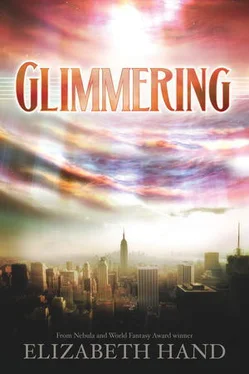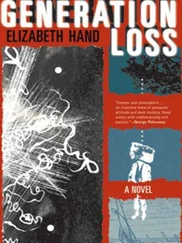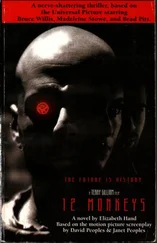Now that we are in the year 2012, and beginning the teens of the twenty-first century, this novel also now serves as a kind of historical novel, documenting how things felt at the end of the nineties. But because of several canny choices or intuitions on Hand’s part, the novel still has a very contemporary feel. For one thing, because Hand was expressing emergent fears, they have now had time to emerge; the novel therefore describes our moment too, but from a different angle. Also, most importantly, her invention of the glimmering, as a kind of grand image or objective correlative of all the environmental damage we are wreaking on the biosphere, was particularly well done. It represents very well many of the particular manifestations of damage that we now see erupting around us, endangering the human community and all our horizontal brothers and sisters. As I write this, for instance, the glimmering is unctuously sheening over the water of the Gulf of Mexico, as if mirroring Hand’s sky. By the time you read this, it may be something else.
When this novel was first published a number of reviews referred to it as a thriller or a horror novel, something that might result from a combination of Stephen King and T. S. Eliot’s “The Wasteland.” There is indeed a strong undercurrent of horror in the situations the main characters are trapped in: sick with incurable diseases, exploited by distant forces and individuals, cut off from those they care about, cut off from their past, and their sense of any possible future: this is the stuff of nightmare. Jack and Martin and Trip and their little communities struggle courageously to create and hold on to meaning in these situations, and much of the suspense of the novel comes from watching them fight so hard, and with a certain amount of success.
So, an element of horror fiction, yes; but when considering the feel of the novel’s internal history, and how well it still fits our current moment a decade later, I was reminded too of the tone of dystopian science fiction. And dystopia is always the reverse side of the coin of the utopian; dystopia’s purpose is to point out the bad result we will reach if we continue on the path we are on, and there is always a utopian urge in that warning—a hope that if the warning is effective enough, we will change direction. When reading Glimmering and thinking about what exactly had gone wrong in its internal history to cast the characters into their dystopian world, I recalled the distinction that Martin Heidegger made between earth and world. Earth in his system is the natural world, the material reality which keeps us alive; world then is the human construct that envelops the natural reality and gives it meaning. In Hand’s novel, Earth has been wrecked, and then humanity tries to go on living, but necessarily in world only. This attempt has a grotesque pathos to it, because it can’t really be done. The characters face an impossible situation, radically impoverished, because they are trying to create meaning out of world alone. This makes for a “Masque of the Red Death” feeling, a hopeless pre-posthumous revelry most clearly represented by the character Leonard. It reminds me of Hemingway’s remark about the publishing industry in Manhattan in the early 1950s, composed of people trying to live in world only—“they’re like worms in a bottle.”
We need the Earth, both the Heideggerian earth and the real earth under our feet and inside our bodies. We can’t do without it. This is what dystopian fiction often says, but seldom so forcefully as in Hand’s dark, intense requiem, her heartfelt warning. If we don’t recognize this need in time, we too will find ourselves in the situation of Jack and his little household of survivors, of Martin and Trip in their Maine refuge, all doing their best to keep humanity not only alive, but human. You won’t forget their story, and that’s good. Take heed.
Afterward he would think , We should have known it was coming. Should have seen it in the fiery darkness above the Palisades, or traced it in the flaming contrails left by disintegrating jets as they plunged into that watery cleft between the Battery and Liberty Island. Fingerprints upon a windowpane, etched in August ice; crocuses blooming in December, then November; peepers waking in the February mud to sing, too early by far, to sing again next spring, and then never to wake again .
We should have known, I should have known , he thought, a hole in the sky, the fabric of the world rent, and we the living should have known what would stream through that shimmering gap, we should have remembered before they returned to remind us: we the dying at the end of the world should never have forgotten the dead.
I. In June 1996, an emergency meeting of the United Nations World Council I. on Carbon Dioxide Emissions and Global Warming was held in Rio Gallegos, Argentina, to discuss the unpredicted and potentially disastrous rise in global temperatures during the previous eighteen months. In a desperate effort to stabilize the atmospheric concentrations of carbon gases, the European Union, allying itself with Trinidad, Tobago, New Zealand, and Australia, led the push for ratifying the 1991 UN climate treaty and the earlier Montreal Protocol. This revised treaty, very narrowly passed despite the vocal and hostile opposition of the United States, China, and Russia, provided for immediate worldwide implementation of an involuntary cap on emissions, as well as an international ban on CFCs and HCFCs. In a concession to pressure from the conservative governments of the U.S., Japan, Russia, and China, the council also passed a bill that permitted limited industrial use of the experimental refrigerant and heating agent bromotetrachloride, or BRITE.
II. In the early 1990s, BRITE had been developed in Finland as a substitute II. for chlorofluorocarbons and hexachlorofluorocarbons, and had been used in experiments to mine gas hydrate in the Arctic. The polar regions’ vast deposits of gas hydrate, with their frozen stores of methane, held the potential to provide twice as much carbon energy as the fossil fuels that had helped cause the rapid degradation of the ozone layer. BRITE appeared to have no adverse environmental effects; unlike CFCs and HCFCs, it degraded in the upper levels of the atmosphere. It was also relatively inexpensive to produce.
By the end of 1996, BRITE was in common use throughout the industrialized world.
III. In March 1997, during an American gas hydrate–mining expedition off the Ross Ice Shelf in Antarctica, a massive series of ocean floor avalanches occurred, releasing a sudden, almost inconceivably vast store of methane from the hydrate reservoir. The Antarctic deposits alone contained over three times the amount of methane found in the atmosphere; methane has a greenhouse effect eleven times that of carbon dioxide. Along with the loss of life and scientific equipment in Antarctica, three thousand canisters of BRITE were destroyed, their contents voided into the atmosphere like smoke.
The gas hydrate explosion had the misfortune to occur at the same time as a massive solar storm, predicted some three days earlier by NOAA’s newly launched Hermes X-ray satellite. Solar physicists at NASA’s Jet Propulsion Lab cheered as the first images crept across their monitors: the sun’s corona disappearing as a billion tons of gas spewed forth. Three days later, this river of solar particles streamed into the Van Allen radiation belt like a celestial lava flow, even as the Ross Ice Shelf collapsed.
This disastrous confluence of events created a surging electrical current that altered the earth’s magnetic field. Transformers exploded; circuit breakers shut down; satellite transmissions were lost as an early night descended upon the world’s cities. Fifty kilometers above the earth, the sun’s ultraviolet rays began a complicated pavane with bromotetrachloride.
Читать дальше












